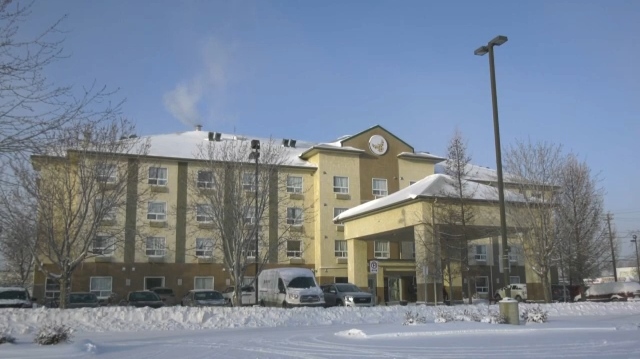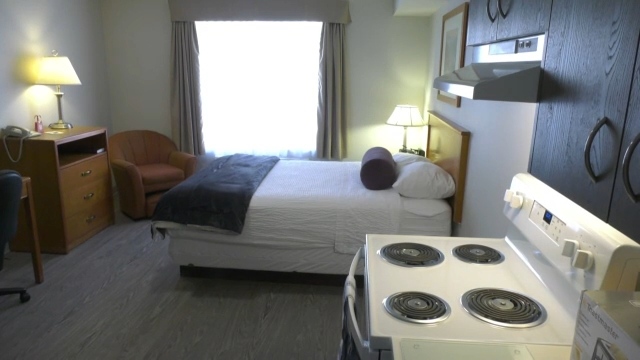Former hotel becomes home for at-risk Edmontonians
 The Mustard Seed Prairie Manor, at 10333 University Avenue, has filled 70 per cent of it's 85 units since opening in summer 2021. (Darcy Seaton/CTV News Edmonton)
The Mustard Seed Prairie Manor, at 10333 University Avenue, has filled 70 per cent of it's 85 units since opening in summer 2021. (Darcy Seaton/CTV News Edmonton)
Dozens of vulnerable Edmontonians are settling into their new permanent homes in south Edmonton.
The Mustard Seed Prairie Manor, at 10333 University Avenue, opened in late summer and is now 70 per cent full. It's an 85-unit supportive housing facility for residents who were previously homeless or at risk of becoming homeless.
"Many Edmontonians who have the means take housing and stability for granted, but there are many Edmontonians that don't have that stability and it's our fundamental responsibility to do more," said Mayor Amarjeet Sohi Tuesday.
“Prairie Manor is not just welcoming Edmontonians who might struggle to keep finding stable housing this winter, it’s giving them a permanent place to call home."
The number of people experiencing homelessness doubled during the pandemic and remains high, Sohi said. Of approximately 2,700 people in Edmonton who are homeless, around 1,250 are living outdoors or in shelters.
Sohi said investment in housing not only helps those experiencing homelessness or unstable housing but reduces strain and costs on the judicial and health-care systems in the long-run.
Tenants sign leases and pay a rent based on 30 per cent of their income. The building has dedicated floors for low mobility and sober living, and residents have access to wrap-around services and 24-hour on-site staff.
 The new Mustard Seed Prairie Manor apartments all include a full kitchen, as well as access to on-site staff support and other wrap-around services for tenants. (Darcy Seaton/CTV News Edmonton)
The new Mustard Seed Prairie Manor apartments all include a full kitchen, as well as access to on-site staff support and other wrap-around services for tenants. (Darcy Seaton/CTV News Edmonton)
There are 49 units reserved for Indigenous people, which Sohi said represents the 57 per cent of Edmontonians experiencing homelessness that identify as Indigenous.
Another 26 units are dedicated to women, he said, who face additional barriers and challenges when homeless.
The former hotel was renovated into apartment suites using $9.2 million provided by the federal government and $1.7 from the City of Edmonton. It's one of eight projects funded by the city and the Government of Canada under the federal Rapid Housing Initiative (RHI), a national program dedicated to housing for vulnerable Canadians.
“This site, made possible through the Rapid Housing Initiative, will bring much needed relief to many of the city's most vulnerable residents,” said Randy Boissonnault, Federal Tourism Minister and Edmonton MP.
Since 2015, Boissonnault said 71,000 supportive housing units have been built in Alberta using federal funding.
For Edmontonians who are still living outdoors or using shelters, the Bissell Centre is asking for winter clothing to help them weather the extreme cold.
"There are encampments all over the city and if those folks are going to survive and have anything resembling comfort over the holiday we need to make sure that they have appropriate winter wear," said Laurence Braun-Woodbury, director of service integration and advocacy at the Bissell Centre.
"The need right now is extremely high. In extreme cold weather such as this people are at risk of life and limb."
The Bissell is a day shelter with a normal capacity of 50, but has been taking in as many as 120 people for the ten hours a day the centre is open.
The Hope Mission has room for 920 people in its overnight shelter, with 854 people staying overnight Monday. The call volume for the Hope Mission rescue van has increased 35 per cent.
If you see someone in distress during extreme cold weather, call 211 and press 3 for Crisis Diversion.
With files from CTV News Edmonton's Marek Tkach
CTVNews.ca Top Stories

Canadian team told Trump's tariffs unavoidable in short term in surprise Mar-a-Lago meeting
During a surprise dinner at Mar-a-Lago, representatives of the federal government were told U.S. tariffs from the incoming Donald Trump administration cannot be avoided in the immediate term, two government sources tell CTV News.
Toronto man accused of posing as surgeon, performing cosmetic procedures on several women
A 29-year-old Toronto man has been charged after allegedly posing as a surgeon and providing cosmetic procedures on several women.
W5 Investigates 'I never took part in beheadings': Canadian ISIS sniper has warning about future of terror group
An admitted Canadian ISIS sniper held in one of northeast Syria’s highest-security prisons has issued a stark warning about the potential resurgence of the terror group.
Trump threatens 100% tariff on the BRIC bloc of nations if they act to undermine U.S. dollar
U.S. president-elect Donald Trump on Saturday threatened 100 per cent tariffs against a bloc of nine nations if they act to undermine the U.S. dollar.
'Disappointing': Toronto speed camera cut down less than 24 hours after being reinstalled
A Toronto speed camera notorious for issuing tens of thousands of tickets to drivers has been cut down again less than 24 hours after it was reinstalled.
Poilievre suggests Trudeau is too weak to engage with Trump, Ford won't go there
While federal Conservative Leader Pierre Poilievre has taken aim at Prime Minister Justin Trudeau this week, calling him too 'weak' to engage with U.S. president-elect Donald Trump, Ontario Premier Doug Ford declined to echo the characterization in an exclusive Canadian broadcast interview set to air this Sunday on CTV's Question Period.
Bruce the tiny Vancouver parrot lands internet fame with abstract art
Mononymous painter Bruce has carved a lucrative niche on social media with his abstract artworks, crafted entirely from the colourful juices of fruits.
Why this Toronto man ran so a giant stickman could dance
Colleagues would ask Duncan McCabe if he was training for a marathon, but, really, the 32-year-old accountant was committing multiple hours of his week, for 10 months, to stylistically run on the same few streets in Toronto's west end with absolutely no race in mind. It was all for the sake of creating a seconds-long animation of a dancing stickman for Strava.
Mont-Tremblant World Cup skiing races cancelled due to warm weather
Fans hoping to see the world's top woman skiers compete next week in Mont-Tremblant, Que., are out of luck after the PwC Tremblant World Cup was cancelled due to warm weather.































